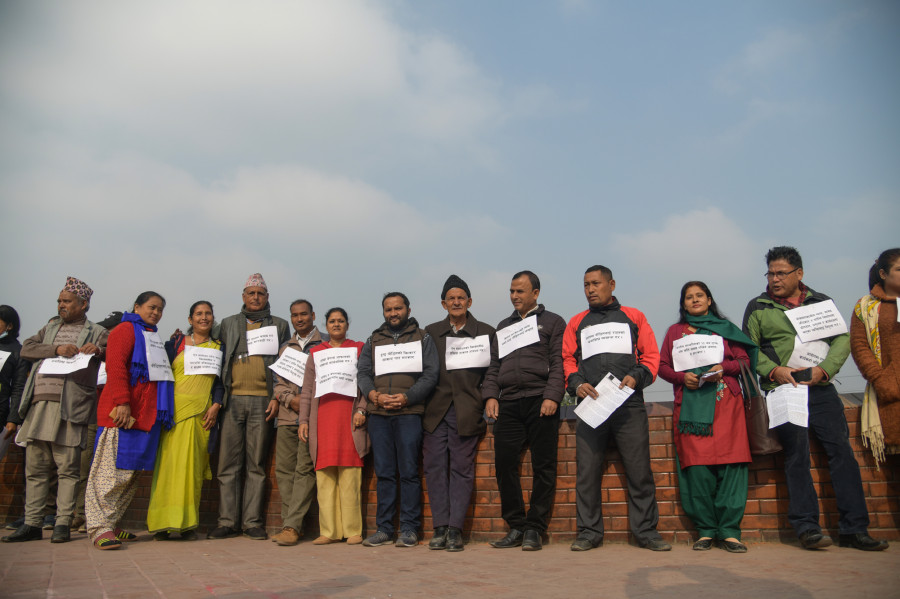National
Conflict victims decry apathy of government and parties towards transitional justice
Thirteen years after the peace deal, victims of the decade-long Maoist insurgency continue to wait for justice.
Binod Ghimire
The Comprehensive Peace Accord was remembered every year for quite some time following its signing on November 21, 2006. The anniversaries were the occasions for the parties to glorify their success in ending the armed conflict and taking the country along the course of peaceful politics.
Time has changed now. Marking the anniversary of the peace accord is missing from the calendar of the political parties. Neither the then-revolutionary Maoists nor other parties, which take the credit for materialising the accord, have organised any programmes on the day in recent years.
“Maybe there are other issues of more importance,” Dev Gurung, the chief whip of Nepal Communist Party (NCP) and a prominent leader of the unified party’s Maoist camp, told the Post explaining why the parties stopped marking the day.
The day might not be a priority of the political parties, but conflict victims are observing it as an occasion to remind the parties of their peace goal, which includes providing justice for the thousands of people who were victimised by the state and the Maoists. Making public information about the people disappeared or killed during the war within 60 days since the pact was signed was one of the major clauses of the peace agreement. However, 13 years since the agreement, the whereabouts of the hundreds of disappeared people remain unknown while other victims are yet to get justice.
The apathy of the parties and the government is forcing conflict victims to take to the streets to build pressure on the state to follow the spirit of the agreement. On the occasion of the 13th anniversary, the Conflict Victims Common Platform held a demonstration at Maitighar Mandala in Kathmandu on Thursday to remind the authorities to provide justice for the victims.
“The government and the parties seem to have adopted the policy to delay and tire the victims,” said Bhagi Ram Chaudhari, chairman of the Platform, at the protest. “We, however, won’t give up unless the state ensures us justice and reparation.”
After the demonstrations, the Platform also picketed the National Human Rights Commission office demanding that Prakash Osti be called back from the committee tasked with selecting the chairpersons and members for the two transitional justice bodies.
Though the constitutional rights watchdog is not satisfied with the way the recommendation committee enlisted probable candidates for the two transitional justice bodies as dictated by the political leaders, it is yet to decide whether to continue its participation in the commission.
Under pressure from different quarters, the government, eight years after the peace agreement, in 2014 issued an ordinance to form the Truth and Reconciliation Commission (TRC) and the Commission of Investigation on Enforced Disappeared Persons (CIEDP). The commissions were formed only a year later and became functional in February 2015. Before their chairpersons and members were relieved of their duties in April earlier this year through an amendment to the Transitional Justice Act, they had barely collected complaints from the victims.
However, around eight months since the recommendation committee led by former chief justice Om Prakash Mishra was formed, it hasn’t been able to finalise the names as it waits for political consensus.
“The recommendation committee has proved to be a shadow of the government and the parties,” said Charan Prasai, a human rights activist. “The new leadership picked through the highly politicised process cannot conclude the transitional justice process.”
The parties have reached an agreement to pick Ganesh Datta Bhatta, associate professor at Nepal Law Campus, to lead the truth commission. They also want the Lokendra Mallick-led team, which steered the disappearance commission for four years, to return.
Since their formation, the TRC and the CIEDP combined have received around 66,000 complaints, which are also against the top leadership of parties and senior security officials. The victims, human rights activists and the international community are asking the government to first amend the Enforced Disappearances Enquiry, Truth and Reconciliation Commission Act-2014, as per a Supreme Court verdict before appointing new people to lead the transitional justice commissions.
Though the government hasn’t taken any step towards amending the Act, Co-chair of the ruling Nepal Communist Party Pushpa Kamal Dahal, who is one of the signatories of the peace accord, said the appointment of new teams will go parallel with the revision in the law.
“Let me make it clear that the Act will be amended as directed by the Supreme Court,” he said in an interaction organised by the Platform on the occasion of the 13th anniversary of the peace accord. “I would also like to assure that there is no blanket amnesty in the cases of grave human rights violations.”
Dahal dismissed reports that the parties want a majority of the old faces to repeat in the truth commission as wrong and claimed that an entirely new set will take charge of the commission. Dahal reiterated that he is ready to take his share of the blame for all that happened during the insurgency and also to face actions if found guilty.
The victims, however, say they want to see the leaders walk the talk. “We want the verbal commitment to be translated into actions. We will not be assured unless Dahal’s statements are reflected in action,” Suman Adhikari, former chairman of the platform, told the Post.




 8.22°C Kathmandu
8.22°C Kathmandu














